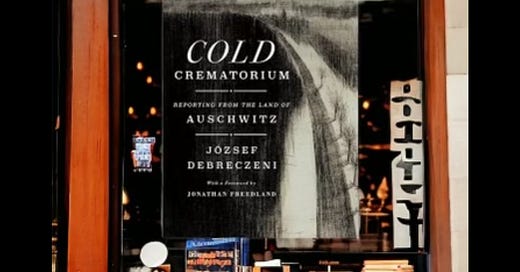Feature Book Review: “Cold Crematorium: Reporting From The Land Of Auschwitz” by József Debreczeni
By Guest Contributing Writer Marc Friedman
“Cold Crematorium” is a masterpiece of Holocaust literature. The author, József Debreczeni, painstakingly created an extraordinary memoir of his desolate life in a chilling land that he called “The Land of Auschwitz.”
Written in 1950, it took over 70 years for “Cold Crematorium” to be translated from Debreczeni’s native Hungarian into English and several other languages.
The book was caught in a tangled web of Cold War politics. It was rejected in the West because it glorified the Soviets. Moreover, because Debreczeni reported that it was Jews rather than “victims of fascism” who were singled out for genocide, the book was too unpalatable to the Stalinists of the East. Thus until 2023, only those who understood Hungarian could read this fearless and absorbing memoir.
In April 1944, and after three years as a forced laborer, 39-year-old József Debreczeni, an accomplished Hungarian journalist and poet, was deported from Hungarian-occupied Yugoslavia to Auschwitz. Upon disembarkation from a railway cattle car, Debreczeni and his fellow Jews were quickly examined by a Nazi team of doctors that included the notorious Dr. Josef Mengele, nicknamed the “Angel of Death.”
Each prisoner then was told to go left or right. If he was directed to the left, Debreczeni’s life expectancy would be about 45 minutes. If to the right, he would be transported to a forced labor camp.
Reading this was particularly striking for when I visited Auschwitz six years ago, I stood in the very spot where the decision on whether Debreczeni should live or die was made.
Debreczeni was told to go to the right, beginning a 12-month journey of brutal slave labor through three different concentration camps in “The Land of Auschwitz.” Though he did not know where he was being taken, the author’s final destination was Dörnhau.
Dörnhau, a so-called labor camp and hospital, was in fact a cold crematorium. It was different from Birkenau, a “hot” crematorium in “The Land of Auschwitz”, where Jews and others were gassed en masse and then cremated.
Jews were sent to Dörnhau for only one reason – to work for three German industrial companies until they died slow, twisting, and painful deaths.
In Dörnhau, thousands of prisoners were literally worked to death, being deprived of necessities like nutrition, clothing, and medical care. The prisoners often would go days without any food. Many would be naked in sub-freezing temperatures.
They would be crammed together in quarters where there was no room to stretch out to sleep. Diseases like typhus were rampant. Disease-carrying lice were ubiquitous. Without any toilets, rivers of human excrement and waste flowed throughout the crude barracks.
Those who managed to survive sometimes would awaken next to a cold corpse, often with the dead man’s excrement spread in the crowded bunk. In many cases, prisoners would prop up the dead body, hoping that it would look alive and be allotted a bit of food for which the prisoners would then battle ferociously. Because they were treated like animals, the prisoners acted like animals.
As Russia’s Red Army closed in from the West, the Nazis quickly abandoned Dörnhau. As sick and frail as the prisoners were, they reveled in their newfound freedom by taking possession of Nazi weaponry and foodstuffs that were left behind, and by wandering outside the barbed wire that surrounded Dörnhau, including to a nearby concentration camp for women.
When Russia’s Red Army arrived, the soldiers were stunned by the sickening condition of the population and Dörnhau’s filth. The Russians immediately quarantined the camp and brought in doctors and nurses, food, clothing, and other necessities required for the prevention of further deaths, and to help the prisoners regain their health.
What makes “Cold Crematorium” a masterpiece of Holocaust literature? First, as an experienced journalist (and poet), Debreczeni was a keen observer of events that he was able to recall and eloquently describe in detail.
Second, the author wrote the book only five years after he and the other survivors gained their freedom, not decades later when recollections often fade. As Jonathan Freedland, a Guardian columnist, observes in his excellent forward, Debreczeni “is a witness, survivor, victim, and also analyst, offering ruminations on some of the enduring questions raised by the Holocaust, among them the puzzle of how arguably the most cultured nation in Europe could have led the Continent’s descent into the most brutal savagery…”
Perhaps the most illuminating aspect of “Cold Crematorium” is the author’s description of the two most essential techniques used by the Nazis to subjugate their prisoners at Dörnhau. While Germans were the ultimate camp authorities, they were rarely seen.
They left it to others to do their bidding. First, the Nazis created a hierarchical structure within a facility where the lowliest of the prisoners – Jewish Kapos, including some who had been criminally convicted before their deportation by the Nazis - were accorded supervisory powers over those, like Debreczeni, who had led more privileged lives. The Kapos were the Nazis’ armed enforcers, often brutally exercising their power with beatings, tortures and even murders of fellow Jews and others.
Second, the Nazis reduced the availability of prison food to the scientifically-determined minimum of calories required for a human being to barely survive. As a result, the prisoners became obsessed with even a few scraps of food; they would fiercely battle with each other over a few morsels when they appeared. As Debreczeni carefully explains, brutal treatment by the Kapos and constant hunger were the two elements of the Nazis’ ruthless system for controlling their prisoners.
“Cold Crematorium” is an extraordinary eyewitness account of life in a concentration camp in “The Land of Auschwitz.” It is extremely well-written, which is not surprising given that the author was an accomplished journalist.
However, because of the brutality Debreczeni describes in chilling detail, it is a very difficult book to read. The stories he tells are harrowing. When “Cold Crematorium” was first published in 1950, one commentator called it “the harshest, most merciless indictment of Nazism ever written.” It is an important contribution to the history of the Holocaust, shining a light into corners of darkness previously unseen.
As I was reading “Cold Crematorium,” I thought about some recent polls that were conducted among younger Americans regarding the Holocaust. For example, in a poll recently conducted by The Economist, 10% of those between 30-44 believe the Holocaust is a myth. More frighteningly, one in five Americans between 18-29 believe the Holocaust is a myth.
Perhaps “Cold Crematorium” should be required reading for high school students and others. It may go a long way toward demonstrating to these young Holocaust-deniers that there is nothing mythical about the Holocaust, particularly as it relates to the experiences of József Debreczeni and others who suffered extraordinary deprivations, including slow and painful deaths, deliberately inflicted by the Nazis and their collaborators across Europe.
In his foreword, Jonathan Freedland concludes, “[l]ike several of those trapped by the Nazi killing machine, Debreczeni understood at the time that, in the future, there would be those whose response to the Holocaust would be to deny such horror ever happened.” “Cold Crematorium” is his compelling and irrefutable rebuttal.
Moreover, reading “Cold Crematorium” at a time when antisemitism is exploding, both in America and throughout Europe, adds an additional dimension to the importance and impact of this book. It becomes a warning – of what could happen when the corrosive rot of hatred toward Jews corrupts society and drives a historically sane nation like Germany into madness.
Mr. Friedman was a trial lawyer for almost five decades. He is now an Executive Coach (see www.mastermethod.co). Mr. Friedman received a B.A in Philosophy from The Johns Hopkins University and a J.D. degree, with honors, from The George Washington University Law School.
Join Us Today and Support Independent Writing
As a supporting member of "Great Books, Great Minds," you'll dive deeper into a world where your book passions thrive. For just $6 a month or $60 a year, you unlock exclusive access to a close-knit community eager to explore groundbreaking reads.
You won't just take in a book; you'll engage in meaningful conversations, connect on a more profound level with fellow book lovers, and enjoy VIP discussions with bestselling authors.
Plus, you'll receive handpicked book recommendations tailored for you. This is your chance to be at the heart of a community where literature bridges souls and authors share their secrets, all thanks to your support.
In the spirit of community, connection, and conversation, please join us today. Always stay thirsty for a great book
Diamond-Michael Scott
Independent Journalist and Global Book Ambassador









Chapter 10 of Hayek's "The Road to Serfdom" - "Why the worst get on top"
Perhaps more Netflix movies/series rather than books at high school?